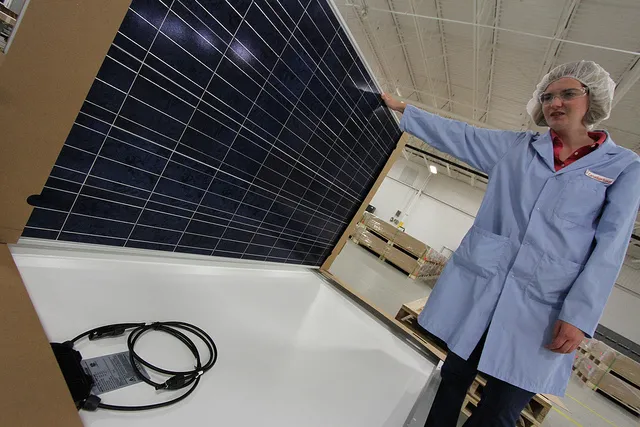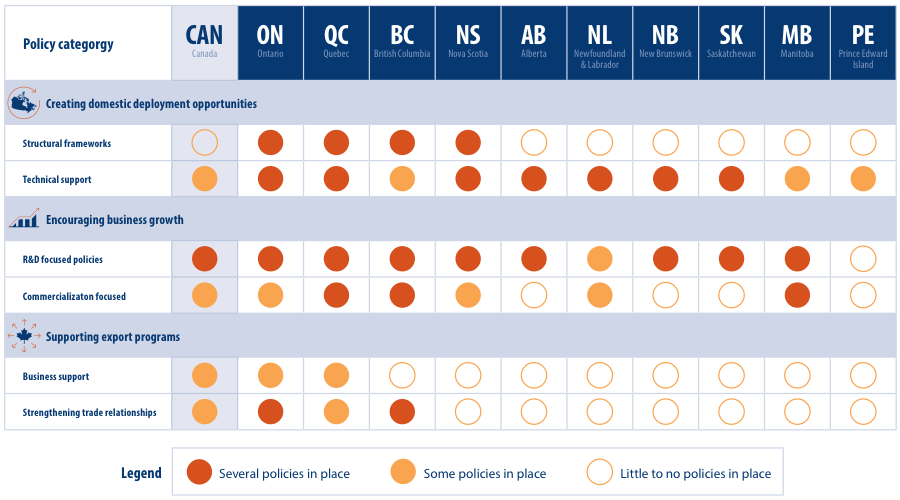The market for clean technology (clean tech) is already big, but it’s about to get a whole lot bigger.
In 2014 alone, global clean energy investments rose by 17 per cent to $380 billion. According to Analytica Advisors, the global clean tech industry reached nearly $1 trillion, with exports of Canadian clean tech industries reaching $5.8 billion or 50 per cent of the industry’s revenue.
Meanwhile, the world’s largest economies (the G7) have committed to phase out fossil fuels by 2100, while China and the United States have struck a historic deal to reduce carbon pollution and increase their use of renewable energy. Numerous governments have also started setting targets to reduce carbon leading up to the global climate summit in Paris later this year. The global market for clean tech is booming.
Something's missing in the Great White North
Yet Canada is falling behind in the clean tech race. According to Analytica Advisors, Canada’s share of the global market declined by 41 per cent since 2005, making it the third-largest loser of market share since 2008.
What’s going wrong with clean tech in Canada? A report we released today shows that Canada lacks a comprehensive strategy and clear policy framework, both federally and provincially, to support the growth of this sector — particularly when it comes to exports.
We examined three categories of policies: those that support domestic deployment of projects, those that encourage business growth and those that help companies to access export opportunities.
While some provinces have more strategies and policies to support clean tech companies than others, Canada as a whole lacks a comprehensive policy framework to support exports in general, at both the federal and provincial levels. Instead, a patchwork of policies — which mainly support research and development (R&D), but largely neglect commercialization and export — are scattered across the country. The result is that many clean tech companies with great innovative products could ultimately fail to get them to market.
This aligns with what we’ve heard before from Canadian clean energy business leaders: the majority say a national approach to carbon pricing, later-stage funding, tax support and proactive export-market assistance are all needed to continue to develop this industry.
Only a small number of programs and policies are currently dedicated specifically to clean tech, and most of them are spread across different industry sectors (for instance, tax incentives and business accelerator programs). The policies and programs that are dedicated to clean tech tend toward R&D support and “greening” public buildings and vehicles.
Canada has a history of successfully encouraging development in targeted industries, such as aerospace, nuclear, digital communications and the oilsands, to name a few. Our governments need to take a co-ordinated and comprehensive approach to growing Canada’s clean tech companies, of which there are more than 800, as they have with our other successful export industries.
A window of opportunity for British Columbia
B.C. is currently grappling with the question of how to ensure its economic health in a changing global economy where there is less demand for fossil fuels. A key part of the answer is to help grow a thriving clean tech export sector.
The province’s clean tech sector already employs over 123,000 people and contributes $15 billion to its GDP. Those jobs include the people working at the 156 renewable energy projects operating or under construction around the province, and the more than 200 companies selling their products around the world.
B.C.’s Climate Leadership Plan process and public consultation is the perfect opportunity to get the province to capitalize further on clean tech, specifically by implementing policies that will help companies continue to succeed well into the future. Now is a good time to let the province know that you would like it to prioritize clean tech in the next phase of its climate plan.
Part of this process should include an emphasis on domestic climate policies, such as strengthening the carbon tax, improving the low-carbon fuel standard and updating the clean energy requirements. All of these policies can help create a local market that allows clean tech entrepreneurs to demonstrate the potential of their solutions for global markets. However, B.C. also needs to place much more emphasis on policies that have been shown to improve exports, such as support for commercialization and strengthening trade relationships.
With a comprehensive strategy and clear policy framework at the federal and provincial levels to support the growth and development of clean tech, we can grow our economy and help the world to tackle its collective climate challenge.











